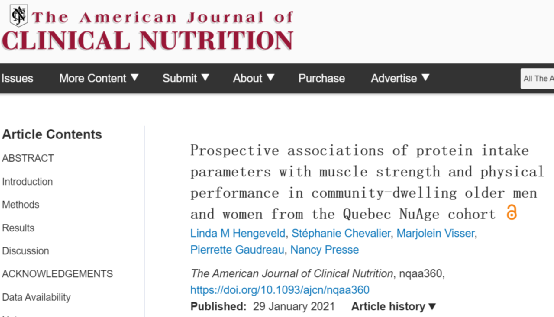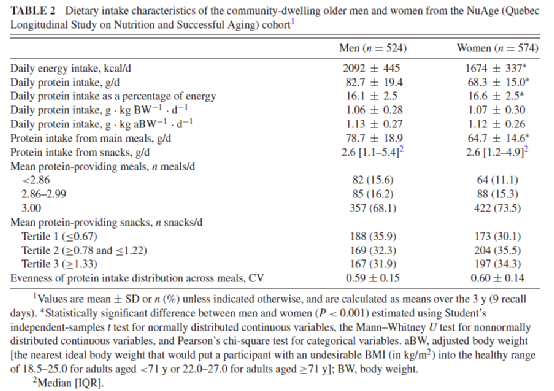
Since the Covid-19 epidemic break up, protein, as the “Center ”that protects human immunity, frequently appears on the trending tab.
However, for a long time, there is still dispute about the recommended dietary protein intake for middle-aged and elder people due to their different need to protein based on their age and gender.

Recently, a joint study from the Netherlands and Canada has revealed the recommended protein intake for the elderly.
The protein intake of the elderly has a “standard”
The study published in the “American Journal of Clinical Nutrition” provides a standard for the protein intake of the elderly: that man’s protein intake per meal reaching 30 to 35 grams, and woman’s reaching 35 at ~50 grams, helps the elderly maintain better knee skeletal muscle strength and physical function.
In order to better understand the role of protein intake parameters in maintaining muscle strength and physical function, the researchers conducts a three-year follow-up study in which 1098 people aging from 67 to 84 (males accounted for 47.7%) who could walk normally has participated. At the same time, a timed start (TUG) test was used to evaluate the physical function and fitness of the participants.
Besides, researchers collected the co-variate information of each participant’s education level, smoking status, BMI, physical activity, and chronic disease history.
The evaluation showed that during the period, the average daily protein intake of men was 82.7±19.4 grams, which was significantly higher than the average daily protein intake of 68.3±15 grams for women. But over time, chronic diseases and drug use among participants increased, and grip strength, knee skeletal muscle strength, and physical function decreased.

Respondents’ dietary intake features
The study showed that for the elder men, the protein intake per meal reaches 30-35 grams could significantly increase the knee skeletal muscle strength and physical function.
For elder women, having more protein is related to lower grip strength and decreased knee skeletal muscle strength. The best protein intake per meal is 35-50 grams. The elderly can reasonably increase their daily protein intake within the recommended intake.
4 key points to supplement protein
Besides keeping healthy, protein supplement also has benefits to improve immunity during the epidemic. How do we take it to achieve the best effects?
◆ For the ordinary people, just have enough protein intake. It is recommended that evenly distribute the fish, poultry, meat and eggs that need to be eaten every day among the three meals.
Eat more high quality protein.
High quality have contains a complete range of essential amino acids, and its ratio is similar to that of the human body. So it can be easily absorbed and utilized.
◆ Increase the high-quality protein ratio to 30% to 50% in you diet. At the same time supplement the protein from different kind of protein sources from animals and plants.
The National Nutrition Week expert group of the Chinese Nutrition Society conducted a nutritional evaluation of common food and selected the top ten kinds of the high quality protein food. They are egg, milk, fish, shrimp, chicken, duck, Lean beef, lean lamb, lean pork and soybean.
Mixed type of protein is more effective.
The combination of animal protein (such as poultry, fish and shrimp, etc.), soy protein and plant protein (such as nuts, rice and flour, etc.) is much better than just having plant protein. It is recommended that a variety of food be mixed and matched to give full play to the “complementary” role of protein.
◆ It is recommended on the basis of ensuring the intake of high-quality protein, to increase the proportion of whole grains, potatoes and other coarse grains in staple food, that the fruits and vegetables should be fresh and abundant, and the intake of bacteria and algae should be appropriately increased. In addition, you need to pay attention to adequate water supply, and the daily drinking water volume should reach 1.5 to 2 liters.

Do not rely on protein powder
◆Protein is only one of the essential nutrients for our body and cannot replace other nutrients. If you don’t eat well and rely only on protein powder, your immunity will decrease. In addition, excessive consumption of protein powder may cause a serious burden on the kidneys and liver.
Protein intake guide for special group.
There is particular requirement of protein intake for some special group. They can not treat as generally.
No.1 The weak people: extra supplement.
Children and teenagers in the growth and development period, pregnant or lactating women, elderly with weakened digestion, people with poor or weak immunity, and patients in the recovery period after surgery should pay special attention to protein supplementation.
If the daily diet is not enough, protein supplements can be taken under the guidance of a doctor.
No.2 Vegetarian:Mix and match of grain and beans
Vegetarians lack high-quality protein such as eggs, milk, and animal protein in their diet. It is recommended to eat more soybeans or soy products, nuts, mushrooms, etc. to increase protein intake.
Cereals plus legumes are comparable to eating meat in terms of supplementing protein. The combination of the two is especially important for vegetarians.

No.3 Patients with kidney disease: eat less plant protein
People with renal insufficiency will have obstacles to excretion of protein metabolites. In order to reduce the burden on the kidneys and reduce blood urea production, such patients should adopt a low-protein diet, and minimize plant protein, intake of high-quality protein, such as milk, eggs, lean pork, fish and shrimp.
No.4 Patients with gout: milk and eggs are preferred
Patients with gout should limit the intake of protein to reduce the intake of purines. The recommended protein intake should be calculated at 0.8-1 gram per kilogram of body weight. Milk and eggs are preferred; the intake of meat, fish, poultry, shrimp and dried beans is also restricted.
No.5 Diabetics: supplement appropriately
The protein intake in the dietary standards for a diabetic should account for 12% to 20% of the total calories, of which 2/3 can be taken from beans, soy products and whole grains, and the remaining 1/3 should be high-quality animal protein.
Adult patients can consume 0.8 to 1.2 grams per kilogram of body weight per day. For example, a diabetic who weighs 60 kilograms can eat about 60 grams of fish, lean meat or eggs per day. For those with malnutrition and weight loss, it can be appropriately increased to 1.2 to 1.5 grams per kilogram of body weight per day.

People who are over-weighted, with coronary heart disease, high blood pressure, and arteriosclerosis disease should try to choose fish, shrimp, chicken, eggs, milk, soybeans and other high-protein, low-fat food.
Comments